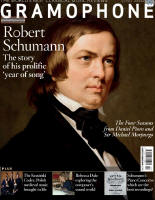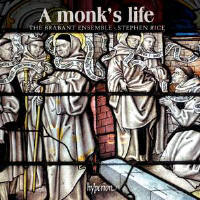Texte paru dans: / Appeared in: |
|
 |
|
|
This is a superb programme mining a rich vein of postReformation music from German-speaking countries, all sung with the characteristic silvery tone of The Brabant Ensemble. Centred around the monastic hours, it also offers a longerrange view of cloistered life in the late 16th century, including ‘Eating and drinking in the monastery’, and it does all of this while exploring lesser-known composers, all of them engaging. Lassus features, too, and combined with next-generation composer colleagues Hassler and Erbach reminds me of another great Hyperion disc, ‘Festal Sacred Music of Bavaria, c1600’ by Westminster Cathedral Choir under James O’Donnell (12/94), which explored their grander ceremonial works with brass and choral forces. It makes for a fruitful comparison, since Stephen Rice showcases similar repertoire in intimate, luminous and altogether lighter performances.
The album opens with Lassus’s Sponsa Dei, a motet in praise of the Virgin, where there is a gentle unfurling of voices hugely different from the harmonically adventurous motet Quis rutilat Triadis? at the other end of the programme. The generous and informative booklet essay by Barbara Eichner explains that both motets are contrafacta (ie have had new words retrofitted) and were originally written in praise of Holy Roman Emperor Maximilian II. That explains the beautiful polyphony as well as moments of odd word-setting.
Beyond Lassus, there are some real finds here: Bernhard Klingenstein’s De vita religiosa receives a warm, intimate performance with exquisite text clarity, and Carolus Andreae’s Magnificat caught my ear with a fluty, high soprano part and, as is so often the case, an expressive patch for the ‘Esurientes’ verse. Only Christian Erbach’s Deus in adiutorium felt a bit too cautious but maybe that’s Monteverdi’s influence, as those words forever conjure his sound world. I was also captivated by Giovanni Giacomo Gastoldi’s Wer wollt den Wein nit lieben? in praise of wine. It is another contrafact, this time of a dance song, and the result is subtle, more like sherry with the vicar than a tavern tune.
In terms of performance this is superb – the singers constantly move between overlapping, sumptuous ars perfecta polyphony to quick-witted, snappy homophony, and they do it at every juncture with great style and fluency. |
|




